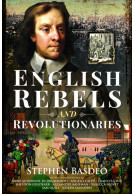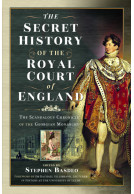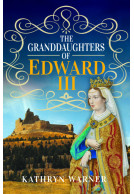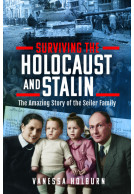Victorian England's Best-Selling Author (Hardback)
The Revolutionary Life of G W M Reynolds
Imprint: Pen & Sword History
Pages: 296
Illustrations: 32 black and white illustrations
ISBN: 9781399015721
Published: 10th October 2022
(click here for international delivery rates)
Order within the next 11 hours, 2 minutes to get your order processed the next working day!
Need a currency converter? Check XE.com for live rates
| Other formats available - Buy the Hardback and get the eBook for £1.99! | Price |
|---|---|
| Victorian England's Best-Selling… ePub (12.3 MB) Add to Basket | £6.99 |
George W.M. Reynolds (1814–79) was one of the biggest-selling novelists of the Victorian era. He was the author of over 58 novels and short stories and his “penny blood” The Mysteries of London, serialised in weekly numbers between 1844 and 1848, sold over a million copies. A controversial figure in his lifetime, Reynolds’s Mysteries, and its follow-up The Mysteries of the Court of London (1849–56), contained tales of crime, vice, and highly sexualised scenes. For this reason Charles Dickens remarked that Reynolds’s name was one “with which no lady’s, and no gentleman’s, should be associated.” Yet Reynolds was much more than just a novelist; he was lauded by the working classes as their champion and campaigned for universal suffrage. To further the working classes’ cause, he established two newspapers: Reynolds’s Political Instructor and Reynolds’s Weekly Newspaper. The latter newspaper, as Karl Marx recognised, became the principal organ of radical and labour politics. This book provides a biography of Reynolds and reproduces his editorials from Reynolds’s Political Instructor.
As reviewed in 2024's Year's Work in English Studies, Oxford University Press
Year's Work in English Studies
Rating: 5 out of 5 stars
NetGalley, Wendy M Rhodes
As an avid fan of anything Victorian. I loved this book, its subject George William MacArthur Reynolds (23 July 1814 – 19 June 1879) is not an author I am familiar with, so to read about him was a pleasure.
Recommended.
Rating: 5 out of 5 stars
NetGalley, Dylan Simon
I thoroughly enjoyed reading this book. As someone who enjoys reading about Victorian England for fun, it was nice to see the authors break down the authors who made this era famous. I would highly recommend this for Victorian enthusiasts, history buffs, Anglophiles, and others interested in the great works of the Victorian Era.
It seems like every era has its writers who, though popular at the time, are forgotten as time passes. Stephen Basdeo presents Victorian England's Best-Selling Author: The Revolutionary Life of G. W. M. Reynolds, one of that era's more unusual cases of being forgotten.
NetGalley, Jack Messer
Admittedly forgotten might not be the right word. The initial shuffling of Reynolds to the periphery was far more intentional than accidental, so he was ignored rather than forgotten. As time went by, his name wasn't available to be appreciated or shunned.
This book is loosely a biography but there are limited facts known about his personal life. That does, however, allow for more of Reynolds' own words to be presented (this is as much an anthology as a biography). His ideas and advocacy juxtaposed with the way many think of Victorian society certainly gives the reader some understanding of why he may have been actively "forgotten" shortly after his death. Yet many of his opinion pieces are quite striking in their modernity (which isn't to say that the specifics within them are quite dated).
For those who have studied literature, formally or informally, this book will be a wonderful way to fill a hole in that knowledge you didn't even know you had. For those who enjoy social history his editorials alone will make this a valuable addition to your library. And for those who just like learning about yesteryear's revolutionaries and troublemakers, this offers quite a bit to think about.
The fact I'd never heard of G.W.M Reynolds before now was surprising once I realised just how prolific he had been. Then as I began to read his work excerpts throughout this book, you really grasped how controversial he was, and how well renowned at the time! It seems almost inconceivable that he isn't a name we know of today.
NetGalley, Sara Buckle
It struck me that we all know Charles Dickens, Oscar Wilde and many others from the era and yet his name is missing. I'm hoping this book can change this somewhat.
This is a book about the best selling author you’ve never heard of and why that should be so is very thought provoking . Within 30 years of his death, George W. M. Reynolds had been almost completely written out of Chartist history and after some 80 years he had been almost forgotten altogether.
NetGalley, Heather Rogers
Ramsey MacDonald was the first biographer of Reynolds, who was born in 1814 and died in 1879. Reynolds left very few personal papers, so the biographer then and now has a difficult task. His current biographers have included a comprehensive collection of his editorials in this book, so he is at least able to speak directly to us.
As an author, however, Reynolds was renowned in his own time too for his Mysteries of London series, which was published in 4 volumes and sold over a million copies. He also wrote 58 full length novels and lots of short stories, poems and essays. His steamy and sordid tales of aristocratic misdemeanours were scorned by the literary establishment then and since, although Les Miserables may have been based on a Reynolds book by Hugo, who knew Reynolds. Reynolds certainly got the idea for his Mysteries from the Paris Mysteries published by Eugene Sue, who he knew when he was living in France. And, like many another, Reynolds was not above peddling his own ‘Pickwick’ stories, which no doubt fuelled Dickens’ dislike of his work.
Perhaps a different age’s practice on plagiarism and copyright have reinforced establishment disdain for Reynolds, who nonetheless died a wealthy man despite the poverty and bankruptcies which dogged his early life.
In a lifetime of radical thought and action, notably in the Chartist cause, but also against flogging in the army, Reynolds became increasingly socialist over the years and his Reynolds Political Instructor and then Reynolds Weekly magazines are testament that from the 1830s to the 1860s radicalism was far more popular than historians have allowed.
Marx himself acknowledged Reynolds popular influence through these publications, while clearly thinking him more of a rogue than his present biographers countenance.
This is an intriguing book on a forgotten history and it is well worth reading.
As featured in
The Bookseller
Who was the best-selling author of the Victorian era? Charles Dickens? The Brontës? Thomas Hardy? Elizabeth Gaskell? William Makepeace Thackeray? George Eliot? Anthony Trollope? Oscar Wilde?
NetGalley, Alya G.
None of the above.
It was a man that is now largely forgotten: George William McArthur Reynolds, who was so popular that at one point he sold over 1 million copies of his work. Born to a family of modest means in England in 1814, he started as a journalist and went into novel-writing at a time when the "penny dreadfuls" were in full swing. Charles Dickens was The Name back then, pumping out these once-a-week serialised novels for a penny that the Victorians consumed with the same fervour we now follow our favourite TV shows in cable and streaming, and Reynolds, then a stereotypical starving author (he even had to file for the royal welfare grant for authors available at the time), found a way to fanfiction Dickens' "Pickwick Papers," that was his most popular at the time. After that, he would publish more and more of his own novels that garnered a respectable following, until one of them exploded in popularity so much it became the unbeatable #1 bestseller penny dreadful of all time, The Mysteries of London.
About Stephen Basdeo
Stephen Basdeo is a historian and the author of several history books and academic journal articles. He has also co-edited and published transcriptions of primary sources for academic publishers.
About Mya Driver
Mya Driver is an independent scholar based in Leeds with an interest in eighteenth- and nineteenth-century fiction. She has previously assisted Stephen Basdeo in transcribing the unpublished works of Robert Southey.




















